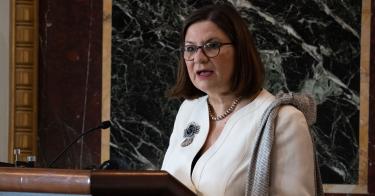Mexico’s ambassador to the United States has been tweeting in Spanish, urging people to make sure they fill out their census forms. Government officials often take a hand in important national projects with electoral and budgetary implications.
Except that, in this case, Amb. Martha Barcena has been tweeting about the U.S. Census, not a Mexican survey. “Even in difficult times, it is very important to respond to the #2020Census,” she wrote in a retweet of an English-language Census Bureau tweet urging people to fill out the Census.
Filling out the Census is a responsibility of all residents of the United States, and counting every last person is of utmost importance. (Though categorizing people into identity groups, something else the Census does, is not important and ought to stop.) But by commenting on a U.S. domestic matter, the ambassador has become but the latest Mexican official to leave the impression that Mexico City believes that the 36.6 million people of Mexican descent in the United States are a “shared” population.
The vast majority of them, or around 30 million, are not. They are American citizens. Some 3.5 million of those were born in Mexico and the other 26.5 million were born Americans, some of them with ancestors on American soil back in the 1600s.
Another 2.8 million Mexican nationals are residing legally in the United States, but close to five million are here illegally. All these figures come from Pew Research’s analysis of data from the American Community Survey and a separate Pew report.
By commenting on the Census, Amb. Barcena, unwittingly perhaps, reminds us that the Census is used to give federal money to illegal residents, as well as give additional political power to elected officials from districts with heavy illegal populations. That is the way federal money is legally spent and congressional seats are legally apportioned. But including illegal residents in these counts does not sit well with everybody.
Data from the Census is used to guide distribution of nearly $1 trillion a year in federal funding, so precincts have an interest in maximizing the numbers of their respondents. Congress also uses data from the decennial Census to apportion congressional seats for the U.S. House of Representatives. Similarly, states use the information to redraw congressional boundaries in the redistricting process.
Because both illegal aliens and lawful permanent residents are barred from voting by both state and federal law, voters in districts with large illegal populations have extra electoral power, diluting the votes of citizens in congressional districts with small non-citizen populations.
There is also the related problem that states with high illegal populations get congressional seats that should go elsewhere, encouraging states to obstruct enforcement of federal immigration law and providing incentives—paid for by citizen taxpayers —to attract illegal aliens to their states. As my colleague Hans von Spakovsky has written, Alabama is suing the Census Bureau on the basis that “four House seats and four electoral college votes were distributed by the inclusion of illegal aliens in the apportionment base in the 2000 census.”
Amb. Barcena’s tweets are also a reminder that, in the eyes of many of Mexico’s leaders, all 36.6 million here with Mexican roots should have some loyalty to Mexico. Their attitude was best epitomized in 2000, when a senior advisor to the newly elected President Vicente Fox said that he “had a strong and clear message from the president to Mexicans abroad—Mexico is one nation of 123 million citizens—100 million who live in Mexico and 23 million who live in the United States” (the numbers then).
The same Fox official then went on ABC News and said, “I want the third generation, the seventh generation, I want them all to think ‘Mexico First’.”
This attitude did not begin with the Fox administration. For his own domestic reasons, President Luis Echevarria in the 1970s helped create and nurture the Chicano Movement north of the Rio Grande. And many of his successors, from Presidents Lopez Portillo and de la Madrid to Zedillo, Calderon and the current president, Manuel Andres Lopez Obrador, have viewed Mexican-Americans as a “shared” population, one that can be leveraged politically, not one over whom they have lost control.
A fiercely independent country, Mexico bristles every time it perceives its own sovereignty as being violated. It has the right to feel that way. And so does the U.S.
Since 1790, the U.S. has managed to complete its Census without assistance from the Mexican embassy. It should be able to do so again in 2020.
This piece originally appeared in The Hill on 4/09/20




